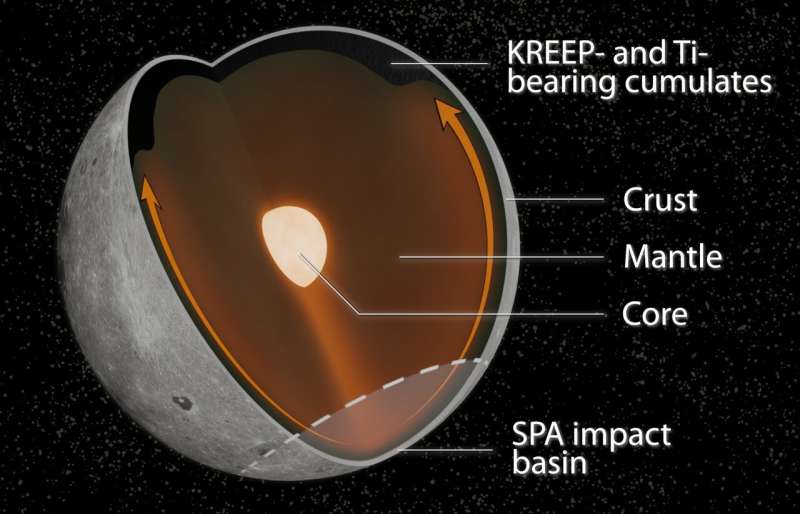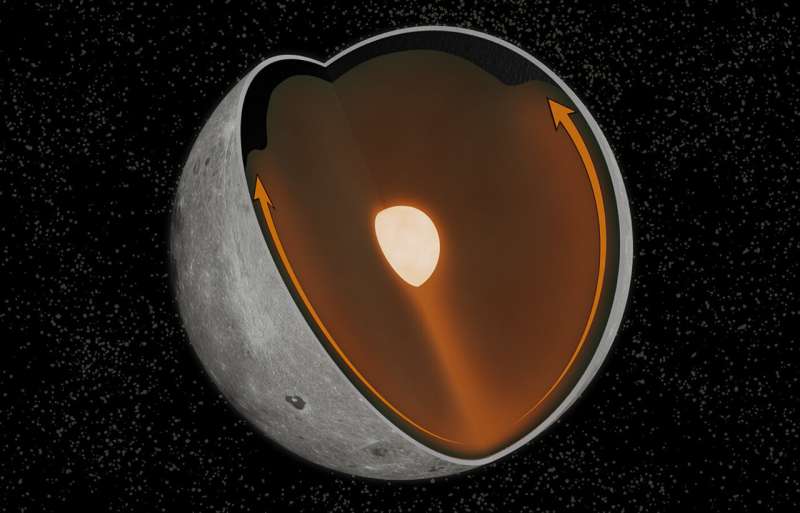Why the two sides are so different is one of the Moon's most enduring mysteries.
Now, researchers have a new explanation for the two-faced Moon—one that relates to a giant impact billions of years ago near the Moon's south pole.
A new study published in the journal Science Advances shows that the impact that formed the Moon's giant South Pole–Aitken (SPA) basin would have created a massive plume of heat that propagated through the lunar interior. That plume would have carried certain materials—a suite of rare-Earth and heat-producing elements—to the Moon's nearside. That concentration of elements would have contributed to the volcanism that created the nearside volcanic plains.
"We know that big impacts like the one that formed SPA would create a lot of heat," said Matt Jones, a Ph.D. candidate at Brown University and the study's lead author. "The question is how that heat affects the Moon's interior dynamics. What we show is that under any plausible conditions at the time that SPA formed, it ends up concentrating these heat-producing elements on the nearside. We expect that this contributed to the mantle melting that produced the lava flows we see on the surface."
The study was a collaboration between Jones and his advisor Alexander Evans, an assistant professor at Brown, along with researchers from Purdue University, the Lunar and Planetary Science Laboratory in Arizona, Stanford University and NASA's Jet Propulsion Laboratory.

The differences between the near and far sides of the Moon were first revealed in the 1960s by the Soviet Luna missions and the U.S. Apollo program. While the differences in volcanic deposits are plain to see, future missions would reveal differences in the geochemical composition as well. The nearside is home to a compositional anomaly known as the Procellarum KREEP terrane (PKT)—a concentration of potassium (K), rare earth elements (REE), phosphorus (P), along with heat-producing elements like thorium. KREEP seems to be concentrated in and around Oceanus Procellarum, the largest of the nearside volcanic plains, but is sparse elsewhere on the Moon.
Some scientists have suspected a connection between the PKT and the nearside lava flows, but the question of why that suite of elements was concentrated on the nearside remained. This new study provides an explanation that is connected to the South Pole–Aitken basin, the second largest known impact crater in the solar system.
For the study, the researchers conducted computer simulations of how heat generated by a giant impact would alter patterns of convection in the Moon's interior, and how that might redistribute KREEP material in the lunar mantle. KREEP is thought to represent the last part of the mantle to solidify after the Moon's formation. As such, it likely formed the outermost layer of mantle, just beneath the lunar crust. Models of the lunar interior suggest that it should have been more or less evenly distributed beneath the surface. But this new model shows that the uniform distribution would be disrupted by the heat plume from the SPA impact.
According to the model, the KREEP material would have ridden the wave of heat emanating from the SPA impact zone like a surfer. As the heat plume spread beneath the Moon's crust, that material was eventually delivered en masse to the nearside. The team ran simulations for a number of different impact scenarios, from dead-on hit to a glancing blow. While each produced differing heat patterns and mobilized KREEP to varying degrees, all created KREEP concentrations on the nearside, consistent with the PKT anomaly.
The researchers say the work provides a credible explanation for one of the Moon's most enduring mysteries.
"How the PKT formed is arguably the most significant open question in lunar science," Jones said. "And the South Pole–Aitken impact is one of the most significant events in lunar history. This work brings those two things together, and I think our results are really exciting."



